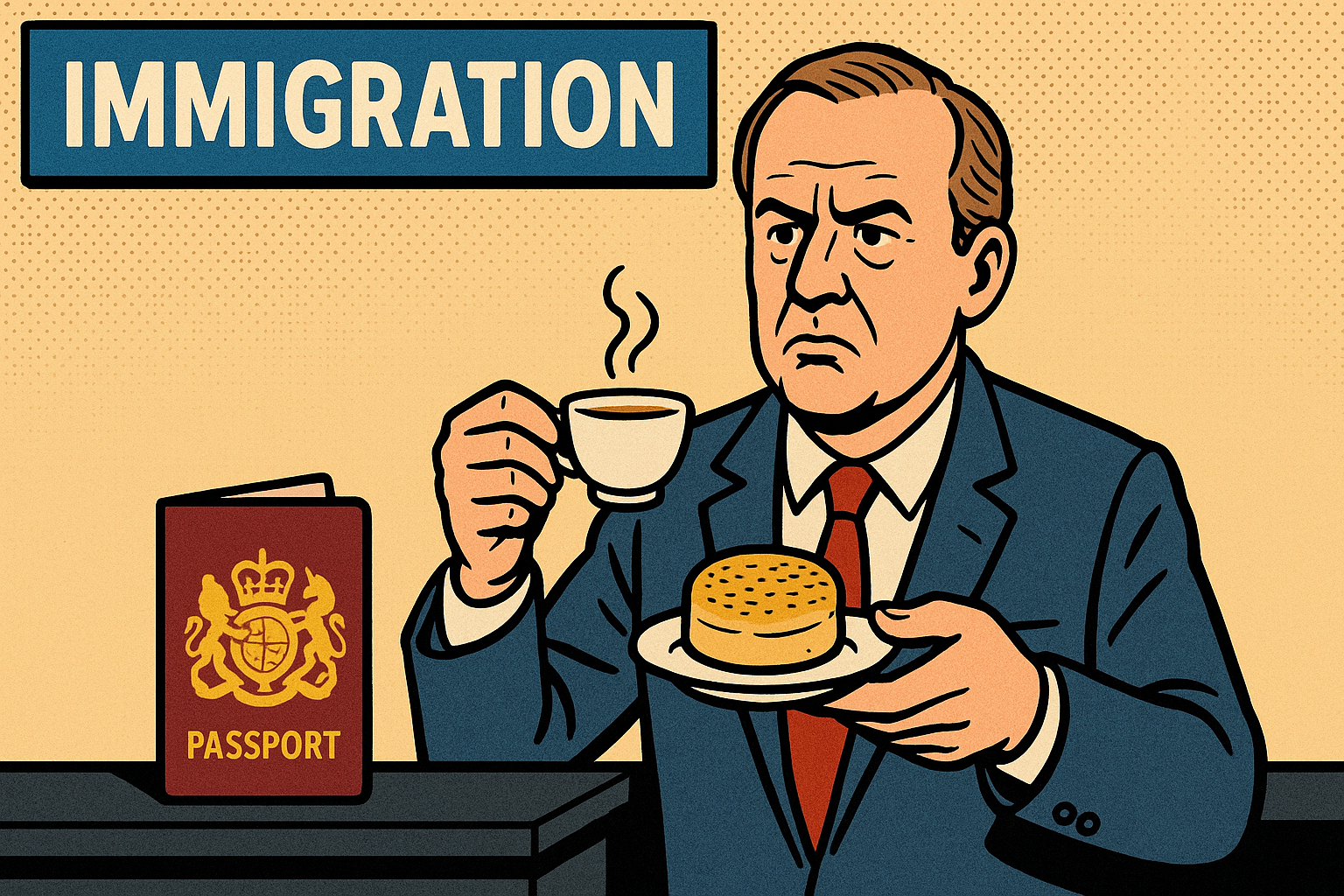London — In a landmark proposal unveiled on Tuesday, the UK Home Office has announced plans for a “Tea & Crumpet Visa” system, which would require citizens to secure entry permits before re-entering their own country. Speaking in Parliament, Home Secretary Felicity Mears described the measure as a “modern solution to dynamic domestic mobility,” assuring MPs that British scones would remain duty-free for the foreseeable future.
Internal documents obtained by The Fraudulent Times reveal that the proposal emerged following a six-month consultation by the Committee on Reassessing Identity and Pastry (CRIP), formed after last year’s brief flour-related immigration scare in Dorset. According to the committee’s white paper, Britishness is “most efficiently verified through a robust, cuisine-based visa program, leveraging universally recognized symbols such as tea and crumpets to streamline border operations.” A 174-page impact assessment concluded that conventional passports could not “sufficiently capture the nuanced crumb-structure of genuine national loyalty.”
Under current plans, returning citizens will be required to present documentation of approved tea infusion procedures as well as a photograph of a standard-issue crumpet (3.6 inches in diameter, two visible perforations minimum) at the Visa Repatriation Kiosks installed at all ports of entry. Acceptable proof of recent scone consumption has been deemed unnecessary after the Scone Clarification Bill of 2021 determined that the item remains “culturally ambiguous, legally fungible, and tax-exempt.”
The Home Office has reassured the public that the new visa system should not significantly disrupt travel, provided applicants submit their basil-and-bergamot compliance forms no later than four weeks prior to re-entry. An expedited “Vicar’s Afternoon” track, for those returning due to urgent Bake Off viewings, will operate at a premium charge, though eligibility may be determined by in-person scrutiny of jam distribution ratios.
Chief Border Technologist Dr. Hester Quib called the plan “an innovative step toward ensuring that only those suitably steeped in national tradition may access local errand services and post offices.” In a pilot test at Stansted Airport, 79 citizens successfully demonstrated proper teapot etiquette, while four were temporarily held in a cordoned-off “Mis-Infusion Zone” after producing what one official labelled “underwhelmingly tepid cups.”
Despite official assurances, several advocacy groups have expressed concern over potential administrative bottlenecks. The Citizen Mobility Bureau cited study data indicating that, during a 2018 test case, nearly 11% of Britons failed to distinguish a crumpet from a pikelet under stress, and a further 17% attempted entry with rogue bagels. Meanwhile, the select subcommittee on Pastry Uniformity has noted that inconsistencies in regional toasting times could result in “widespread pastry-related detentions.”
As Parliament prepares to debate the plan next week, a new round of Home Office leaflets urge Britons abroad to “Stay Calm and Carry Scones,” reminding them that while national belonging may now require proof of crust and crumb, at least the beloved scone floats above regulatory reach—though, as one government spokesperson warned, “we must not rule out tarragon-based controls in the future.”
For now, the British public faces the reassuring certainty that their borders remain, as always, porous to cakes, but resolute against unsanctioned infusion.

Deixe um comentário